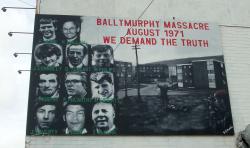By Harry Hutchinson, Labour Party Northern Ireland
In August 1971, under operation Demetrius, immediately after the introduction of internment without trial by the British government, paratroopers entered the Ballymurphy Estate in West Belfast and shot dead 10 civilians over a 3-day period. An inquest into those killings is now taking place in Belfast.
The inquest heard that none of the victims had weapons nor had at any time fired a shot. At least two of the victims were shot in the back and one had received 14 bullets in his body. The inquest heard that Jean Connolly could have been saved, had she not been denied medical treatment. Catholic Priest Father Hugh Mullan was shot dead while giving the last rights to a dying man.
Two brothers aged 14 and 18 years were dragged from their home and beaten while a man lay dying outside their front door.
Evidence emerged in 2015 that one of the Ballymurphy victims was shot a second time while being held in the Army Barracks.
Army witnesses at the inquest have claimed that “rogue soldiers killed people, knowing they would be protected.” Another witness claimed that the paratroopers considered that “anything out there that moves should be considered to be IRA and should be shot.”
One witness at the Inquest claimed that after the killing spree, paratroopers held a sweepstake, where the winner was picked out of a hat and went on the ‘piss’ with the winnings (money). Another paratrooper used a victim’s skull as an ash tray. Those claims were made by a former soldier, policeman and SAS member, who wrote his autobiography Killing Zone, published in 1995. He was not a part of the unit that went into Ballymurphy, but giving testimony he stood by his claim that the soldiers in the base boasted of their killing and showed no remorse.
A woman at the inquest gave evidence of having seen some of the killings from her bedroom window, describing how she watched as a soldier shot two people several times as they lay on the ground.
General Jackson (then a Captain in 1971) claimed in his autobiography that “all those killed at Ballymurphy were Republican gunmen” but under cross examination at the inquest he could not explain why none of the paratroopers were questioned or de-briefed after the killings.
Five months after Ballymurphy, this same Jackson was present at the Bloody Sunday massacre in Derry when 13 unarmed civil rights protesters were gunned down. The British Army later promoted him and in 2003 he was appointed Chief-of-Staff, just before the Iraq war.
It is unlikely that any of the paratroopers will face justice for their war crimes, least of all General Jackson, who is alleged to have ordered the paratroopers in to carry out the slaughter of innocent civilians.
The Ballymurphy massacre, like that on Bloody Sunday in Derry, was part of a state crackdown on the people of Northern Ireland. Catholic and Protestant workers and students, were on the streets in what had begun as a civil uprising, in opposition to the Unionist government, demanding equality on jobs, housing, education and voting rights.
Almost half a century after those bloody events in Ballymurphy an inquest is finally taking place. Some of what happened around those events in August 1971 have shocked and angered the families of those killed.
June 8, 2019



